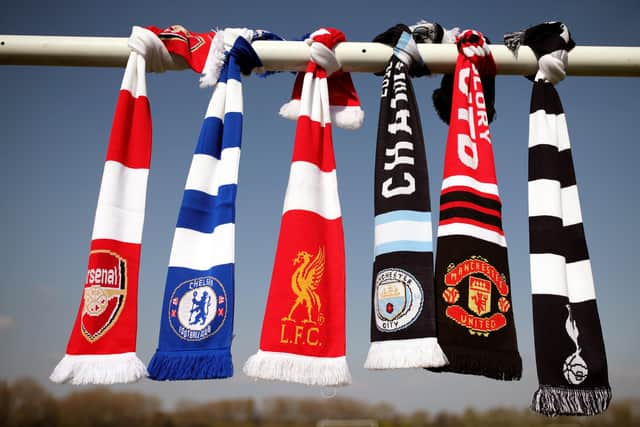What now for European football after Super League fiasco?
and live on Freeview channel 276
Here, the PA news agency analyses where we go from here.
What’s happened?
Twelve of Europe’s richest clubs announced last Sunday night they had signed up to a new Super League competition, which would have been a direct challenge to UEFA’s prestigious Champions League.


By Wednesday afternoon all but two of those clubs – Real Madrid and Barcelona – had either issued a withdrawal or an acceptance that the project had been torpedoed.
Why was it such a problem?
Advertisement
Hide AdAdvertisement
Hide AdAs well as completely undermining UEFA’s flagship club event, it would also devalue the domestic leagues the clubs operated in by removing at a stroke the intrigue of the race for European qualification. The rebel clubs were told in no uncertain terms that if they wanted to form a Super League, they and their players would be putting themselves outside football’s mainstream.
Will they be punished?
It is understood the Premier League is still looking at the possibility of sanctions, and while UEFA has welcomed the U-turns by some clubs there are still those – like Real Madrid president Florentino Perez – who are unrepentant.
Will any of this damage the clubs involved?
Fines and reprimands are one thing, but the loss of influence could be a far more significant outcome. It is understood English football’s so-called ‘Big Six’ representatives have been asked to stand down from key Premier League committees which make recommendations on broadcast strategy and the league’s future structure and governance.
At a European level, the clubs no longer hold positions of power at the European Club Association after resigning from them on Sunday. They would also struggle, it could be argued, to wield the threat of another breakaway over UEFA considering how disastrously this one turned out.
Advertisement
Hide AdAdvertisement
Hide AdIsn’t the new-look Champions League format basically a Super League anyway?
It’s true that many of the changes from the current competition – more matches, a safety net for historically successful teams who fail to qualify by right – were the result of pressure from the big clubs when they were within the ECA. But it is understood that with the big clubs weakened by this week’s events, those who railed against those changes like the European Leagues will seek a renegotiation of terms.
So where has the power shifted?
Emphatically to last season’s Champions League finalists Bayern Munich and Paris St Germain, who resisted attempts to convince them to join the Super League. The president of the French club, Nasser Al Khelaifi, was chosen as the new chairman of the ECA on Wednesday night.
Will the big clubs be allowed back into the ECA?
That’s the big question. Al Khelaifi spoke of the need for unity in accepting his new position and sources close to him say he may feel it is better to have the rebel clubs ‘in the tent’ than out of it. But it is difficult to see them returning on the same terms and holding so much power within the ECA.
How else might the landscape change as a result of this?
Advertisement
Hide AdAdvertisement
Hide AdThe Super League created enough of a stink to prompt the Government to go early with its fan-led review, which it had wanted to launch once the country had recovered from the coronavirus pandemic.
Groups such as the Football Supporters’ Association know this is a huge opportunity to force governance change over issues such as club ownership.
A message from the Editor:
Thank you for reading this story on our website. While I have your attention, I also have an important request to make of you.
With the coronavirus lockdown having a major impact on many of our advertisers - and consequently the revenue we receive - we are more reliant than ever on you taking out a digital subscription.
Advertisement
Hide AdAdvertisement
Hide AdSubscribe to newsletter.co.uk and enjoy unlimited access to the best Northern Irish and UK news and information online and on our app. With a digital subscription, you can read more than five articles, see fewer ads, enjoy faster load times, and get access to exclusive newsletters and content. To subscribe, click here.
Our journalism costs money and we rely on advertising, print and digital revenues to help to support them. By supporting us, we are able to support you in providing trusted, fact-checked content for this website.
Thank you,
Alistair Bushe
Editor
Comment Guidelines
National World encourages reader discussion on our stories. User feedback, insights and back-and-forth exchanges add a rich layer of context to reporting. Please review our Community Guidelines before commenting.